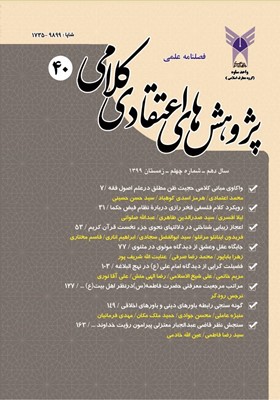گونه سنجی رابطه باورهای دینی و باورهای اخلاقی
محورهای موضوعی : کلام اسلامیمنیژه عاملی 1 , محسن جوادی 2 , حمید ملک مکان 3 , مهدی فرمانیان 4
1 - دانشگاه ادیان و مذاهب
2 - قم
3 - دانشگاه تهران
4 - دانشگاه ادیان و مذاهب قم
کلید واژه: دین, اخلاق, تعامل, تقابل, تباین.,
چکیده مقاله :
به اعتقاد بسیاری از فیلسوفان سابقه بحث از رابطه دین واخلاق به قدمت خود فلسفه است.امّا افلاطون با طرح گفتگوی سقراط با اوثیفرون شکل جدّی تری به آن داد. بحث از رابطه دین واخلاق درمیان مسلمانان به عنوان یکی از مسائل مهم کلامی مورد مداقّه بوده و به پیامدهای اخلاقی آن کم تر پرداخته اند. امّا رابطه دین واخلاق در اشکال مختلفی متصوّر است که در این نوشتار به حصر عقلی سه گونه«تباین دین از اخلاق» ،«تقابل دین با اخلاق»و«تعامل دین و اخلاق» سنجیده و در این میان ضمن تأیید تعامل دین واخلاق ،چگونگی و جهت این رابطه ارزیابی میگردد. درامتداد این بحث برای تبیین وابستگی اخلاق به دین،از میان گونه های مختلف وابستگی اخلاق به دین،وابستگی«معنا شناختی»،«وجودشناختی»،«معرفت شناختی»و«روان شناختی» اخلاق به دین را می سنجیم. درحقیقت گونه سنجی رابطه دین واخلاق با رویکرد علمی-پژوهشی،ما را به این نتیجه میرساند که اخلاق زاییده حقیقی ترین منبعی است که همه خیرات،مصالح و سعادات از آن ناشی می شوند و آن«دین»است.
Many philosophers believe that the history of the relationship between religion and morality is as old as philosophy itself. But since the time of Plato, Socrates' conversation with Othifron has taken on a more serious form. The discussion of the relationship between religion and morality among Muslims has been considered as one of the important theological issues and less attention has been paid to its moral consequences. However, the relationship between religion and morality is imagined in different forms. In this article, three types of "religion contrast with morality", " religion opposition with moral " and "interaction of religion and morality" have been rationally evaluated. In order to explain the dependence of morality on religion, we examine the "semantic", "ontological", "epistemological" and "psychological" dependence of morality on religion among the different types of moral dependence on religion. In fact, the typology of the relationship between religion and ethics and the scientific-research approach leads us to the conclusion that morality is the most real source from which all goodness, interests and happiness come, and that is "religion".
